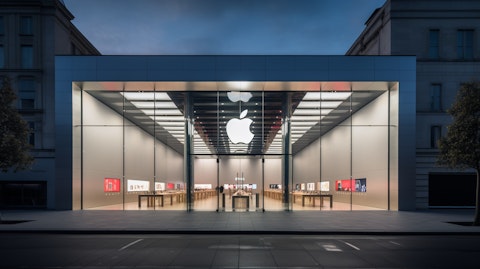We recently compiled a list of the 10 Best Beginner Stocks To Buy Now. In this article, we are going to take a look at where Apple Inc. (NASDAQ:AAPL) stands against the other beginner stocks.
While investing in the stock market carries risk, the US stock market is generally considered a safe place to invest. It has a long history of growth and has consistently recovered from downturns, including major recessions and financial crises.
Over the last four to five years, the market has been hit by several unexpected downturns, due to a global pandemic and the Russia-Ukraine war, among other things, that crippled the global economy. However, the US broader market recovered swiftly and has been performing well since 2023. It is nearly 19% up year-to-date, as of August 23.
Nevertheless, it is still a complicated place for beginners and they should consider investing in shares of well-established companies with a history of stable performance and reliability. These stocks typically belong to large, financially sound companies that operate in diverse industries, such as technology, consumer goods, and healthcare.
Additionally, beginners can also look into index funds or exchange-traded funds (ETFs) that track major market indices like the S&P 500. These options offer diversification, which reduces the risk associated with investing in individual stocks while still providing exposure to the broader market’s potential gains. Investing in such well-established and diversified assets can help beginners build confidence and knowledge in the stock market. For such ETFs, you can check out our article on the best large-cap growth ETFs.
Opportunities and Caution for New Investors Due to Consumer Behaviour
On August 16, Melissa Minkow, director of retail strategy at CI&T, discussed the latest trends in U.S. consumer spending in a CNBC interview. Despite concerns about a potential recession, Minkow believes we might have avoided one. She pointed out that although consumers may feel like they are in a recession, their spending habits show otherwise. They continue to spend, especially when presented with discounts. Retailers have adapted by offering more targeted promotions this year, which has helped maintain consumer spending despite previous challenges like the pandemic and supply chain issues.
Minkow also noted that the effectiveness of promotions can vary across sectors. For example, quick-service restaurants like McDonald’s and Starbucks haven’t seen the same benefits from discounts as other retailers, partly because consumers may opt for more cost-effective alternatives like home-cooked meals. Additionally, brands that are already positioned as discount options might not see as much impact from promotions. However, retailers who offer significant discounts on desirable items can attract cost-conscious shoppers and increase sales volume, potentially offsetting the impact on profit margins.
For beginner investors in the stock market, the current retail sector dynamics offer both opportunities and challenges. The resilience of consumer spending, even in the face of economic uncertainty, suggests that certain sectors and companies could continue to perform well, especially those that effectively use promotions to drive sales. Retailers offering targeted discounts on popular items may attract more customers, boosting their sales volumes, which could lead to positive stock performance.
However, beginner investors should also be cautious. Not all companies benefit equally from promotions, as seen with the restaurant and food segment, where discounts haven’t significantly improved earnings. This highlights the importance of understanding the specific business models and market positioning of companies before investing.
The Market is Healthy but Caution is Advised
The U.S. stocks have seen a significant surge over the last few quarters, which are mainly driven by strong economic data and optimism about a potential soft landing for the U.S. economy. However, experts remain cautious as we discussed in our best defensive stocks article.
In the article, we discussed the J.P. Morgan report that noted the market’s heavy reliance on large, high-quality tech and AI companies, and it warned that maintaining this momentum could be challenging due to high valuations and potential market volatility. Here is an excerpt from the article:
“According to a July report by J.P Morgan, recent market trends have benefited large, high-quality companies, especially in tech and AI, which have resulted in high market concentration. However, maintaining this momentum in the second half of 2024 could be difficult due to high valuations and investor positioning. The report says that while U.S. market volatility is currently low, it could rise if conditions change.
According to Bruce Kasman, global growth is steady at 2.4%, with improved recoveries in Western Europe and emerging markets, along with a rebound in the manufacturing sector. Despite this, core global inflation is projected to remain around 3% in 2024, which could limit the potential for policy easing. Kasman warned that achieving inflation control and rate normalization might weaken demand and could interact with political factors to cause further inflation and central bank tightening.”
Our Methodology
For this article, we used stock screeners to identify large to mega-cap stocks with a revenue compound annual growth rate of at least 5% over the last 10 years. The companies we chose are well-known, well-established, fundamentally strong, and some also pay regular dividends. We listed the companies in ascending order of their hedge fund sentiment as of the second quarter of 2024.
Why are we interested in the stocks that hedge funds pile into? The reason is simple: our research has shown that we can outperform the market by imitating the top stock picks of the best hedge funds. Our quarterly newsletter’s strategy selects 14 small-cap and large-cap stocks every quarter and has returned 275% since May 2014, beating its benchmark by 150 percentage points (see more details here).

A wide view of an Apple store, showing the range of products the company offers.
Apple Inc. (NASDAQ:AAPL)
Number of Hedge Fund Holders: 184
10-year Revenue CAGR: 8.03%
Apple Inc. (NASDAQ:AAPL) is a prominent American multinational technology company and is known for its groundbreaking consumer electronics, software, and services. The company first gained recognition with the launch of its Apple I personal computer.
Over the years, the company has transformed into one of the world’s most valuable brands, renowned for its flagship products such as the iPhone, iPad, Mac, Apple Watch, and Apple TV. In addition to its hardware, it offers a range of digital services, including the App Store, Apple Music, Apple TV+, iCloud, Apple Pay, and AppleCare. It is fourth on our list of the best beginner stocks to buy now.
Apple (NASDAQ:AAPL) has long been a significant player in the technology sector, and it is set to build on its position with an ambitious push into generative AI. While AI has been part of the company’s ecosystem for years, through the Siri virtual assistant, it is ready to better its AI capabilities with the upcoming launch of Apple Intelligence.
The new suite of features, expected within the year, will introduce a refreshed Siri interface and offer functionalities such as email summarization, content rewriting in various tones, and phone call transcriptions. Future updates will include integration with OpenAI’s ChatGPT, which further expands its AI capabilities.
Apple (NASDAQ:AAPL) has been integrating AI accelerators into its M-series processors from the start, which positions the company uniquely in the tech landscape. By making Apple Intelligence compatible with all Apple Silicon Macs, iPads with M-series processors, Vision Pro, iPhone 15 Pro, and future iPhones, the company will likely possess the largest base of AI-capable devices. Its devices, powered by the M-series and A17 Pro processors, will possibly be able to handle complex AI tasks directly on the device rather than relying on cloud computing.
In addition to these advancements, the company remains a high-margin leader in the tech industry. In the third quarter, it saw a 5% increase in net sales, reaching $85.8 billion. This growth was fueled by a 14% rise in services revenue and substantial iPhone sales, which totaled $39.3 billion.
With its continued innovation in AI and robust financial performance, the company is well-positioned for sustained growth and market leadership. The expansion of AI functionalities across its product lineup and impressive sales figures highlight the company’s ongoing potential and strategic direction.
In the second quarter, 184 hedge funds had stakes in Apple (NASDAQ:AAPL), with total positions worth $124.175 billion. With 400 million shares worth $84.248 billion, Warren Buffett’s Berkshire Hathaway is the most prominent shareholder in the company, as of June 30.
Baron Opportunity Fund stated the following regarding Apple Inc. (NASDAQ:AAPL) in its Q2 2024 investor letter:
“This quarter we re-initiated a position in Apple Inc. (NASDAQ:AAPL), a leading technology company known for its innovative consumer electronics products like the iPhone, MacBook, iPad, and Apple Watch. Apple is a leader across its categories and geographies, with a growing installed base that now exceeds 2 billion devices globally. The company’s attached services – including the App Store, iCloud, Apple TV+, Apple Music, and Apple Pay – provide a higher margin, recurring revenue stream that both enhances the value proposition for its hardware products and improves the financial profile. Apple now has well over 1 billion subscribers paying for these services, more than double the number it had just 4 years ago. The increasing services mix has led to healthy operating margin improvement, providing more free cash flow for Apple to reinvest in the business and to distribute to shareholders. Throughout its 48-year history, Apple has successfully navigated and capitalized on major technological shifts, from PCs to mobile to cloud computing. We believe the company’s leading brand and device ecosystem position it to do equally well in the AI age, and this was the driver of our decision to re-invest. “Apple Intelligence” – the AI strategy unveiled at Apple’s recent Worldwide Developer Conference – leverages on[1]device AI and integrations with tools like ChatGPT to enhance user experiences across its ecosystem. The AI suite enables users to create new images, summarize and generate text, and use Siri to perform actions across their mobile applications, all while maintaining user privacy and security. We think Apple Intelligence can drive accelerated product upgrade cycles and higher demand for Apple services. The combination of growth re-acceleration, increasing services contribution, and thoughtful capital allocation should continue driving long-term shareholder value.”
Overall AAPL ranks 4th on our list of the best beginner stocks to buy. While we acknowledge the potential of AAPL as an investment, our conviction lies in the belief that AI stocks hold greater promise for delivering higher returns and doing so within a shorter timeframe. If you are looking for an AI stock that is more promising than AAPL but that trades at less than 5 times its earnings, check out our report about the cheapest AI stock.
Read Next: $30 Trillion Opportunity: 15 Best Humanoid Robot Stocks to Buy According to Morgan Stanley and Jim Cramer Says NVIDIA ‘Has Become A Wasteland’.
Disclosure: None. This article is originally published at Insider Monkey.





